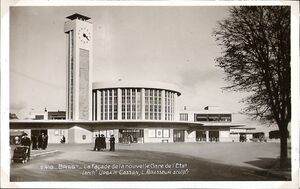3. April 1943
| GEO INFO | ||||
|---|---|---|---|---|
| Brest | ||||
Now it’s final: we’re going back to Russia. It all happened very quickly. I stand in front of Mme Jacob, field-march style, to say goodbye. She gives me another half pound of butter and sells me a bottle of cognac and the rare Benedictine. She wants me to write to her one day, and I promise. Seven years later, after my release from Soviet detention, I made good on my promise and received a joyful reply.
Behind the "New State Railway Station" at the port of Brest is the goods station. Here our battalion has pulled up and is beginning to load."[1] Despite the air cover in which most of the vehicles are standing, the loading area is teeming with vehicles of all kinds. In some places the bales of straw are piled into high mountains, and between them soldiers run back and forth like busy ants, hauling equipment into the wagons or leading teams of horses in. In a few hours we shall be ready. The officers gradually gather and go to their compartments. Some German and French girls had come to bring us some flowers as a farewell. They are the two bar girls from the sea commander’s house and some of the girls with whom we had once celebrated in St. Renan. Now they stand a little lost in the emptying square.
By the way, the rascal of a battalion doctor who behaved so badly at the time is not coming with us. He got himself written up as unfit for frontline duty, supposedly because of a heart defect. I’m sure his doctor colleague was happy to confirm that. We’re supposed to help each other and stick together as comrades here in the rear echelons! You see, everything can be arranged if you have connections. But we’re not angry about it. Such a quitter doesn’t fit in with us. At the front we need loyal comrades.
And there’s one more who stayed behind: First Lieutenant Jablonski, the horse farmhand with the gallows bird face, who had been our boss in Slavyansk and Rai Gorodok. He was left behind as a local commander in a small French village. To put this unworthy and incompetent representative of Germany in this post was again a typical blunder. When the Reichsdeutsche offices had to second a staff member to the occupied territories, they often dispatched the incompetent or the unpopular, who then made themselves just as unpopular abroad, to the detriment of our reputation. But the troops do the same. Who likes to give away his capable people?! And then a jolt goes through the transport train. It starts slowly, rolls along the high cliffs of the Roadstead of Brest and then turns into a curve that takes the city and the waving girls out of our sight.
We just see an Anglo-American bomber unit approaching.[2] Whether they wanted to disrupt our loading and were delayed, or whether they targeted the harbour, we do not know. We still feel the light air pressure of the explosions, and the distant rumble of the detonations mixes with the dull rumble of the train as it rolls off.
Goodbye, beautiful times!
Addendum. Once a delegation from our Japanese allies visited our area. In order to feign a large troop strength, the units were instructed to send out marching columns on the roads over which the Japanese delegation’s motorcade passed. They also passed our battalion, but the Japanese leaned asleep in the back of the car and ignored us completely. They probably knew how to fake.
|
Editorial 1938 1939 1940 1941 1942 1943 1944 1945 1946 1947 1948 1949 Epilog Anhang |
|
January February March April May June July August September October November December Eine Art Bilanz Gedankensplitter und Betrachtungen Personen Orte Abkürzungen Stichwort-Index Organigramme Literatur Galerie:Fotos,Karten,Dokumente |
|
1. 2. 3. 4. 5. 6. 7. 8. 9. 10. 11. 12. 13. 14. 15. 16. 17. 18. 19. 20. 21. 22. 23. 24. 25. 26. 27. 28. 29. 30. 31. Erfahrungen i.d.Gefangenschaft Bemerkungen z.russ.Mentalität Träume i.d.Gefangenschaft Personen-Index Namen,Anschriften Personal I.R.477 1940–44 Übersichtskarte (Orte,Wege) Orts-Index Vormarsch-Weg Codenamen der Operationen im Sommer 1942 Mil.Rangordnung 257.Inf.Div. MG-Komp.eines Inf.Batl. Kgf.-Lagerorganisation Kriegstagebücher Allgemeines Zu einzelnen Zeitabschnitten Linkliste Rotkreuzkarte Originalmanuskript Briefe von Kompanie-Angehörigen |
- ↑ Departure from Brest 1-6 Apr 1943 (KTB OKW 1943 p. 265 and 290, KTB AOK 7 Frame 000362-000367)
- ↑ Acc. to KTB OKW 1943 pp. 277 and 287, attacks were made on Brest on 3 and 5 Apr 1943 with 25 and 18 aircraft respectively. Since I./477 was unloaded in the middle of five days, the attack in the middle of the loading days, i.e. the one on 3 Apr 1943, must be described here.

